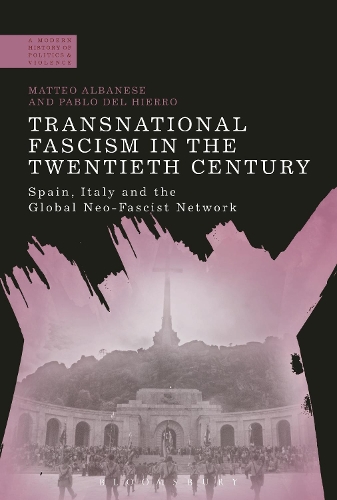
Transnational Fascism in the Twentieth Century: Spain, Italy and the Global Neo-Fascist Network
(Paperback)
Available Formats
Publishing Details
Transnational Fascism in the Twentieth Century: Spain, Italy and the Global Neo-Fascist Network
By (Author) Dr Matteo Albanese
By (author) Dr Pablo del Hierro
Bloomsbury Publishing PLC
Bloomsbury Academic
22nd March 2018
United Kingdom
Classifications
Professional and Scholarly
Non Fiction
320.53309450904
Physical Properties
Paperback
240
Width 156mm, Height 234mm
340g
Description
Developing a knowledge of the Spanish-Italian connection between right-wing extremist groups is crucial to any detailed understanding of the history of fascism. Transnational Fascism in the Twentieth Century allows us to consider the global fascist network that built up over the course of the 20th century by exploring one of the significant links that existed within that network. It distinguishes and analyses the relationship between the fascists of Spain and Italy at three interrelated levels - that of the individual, political organisations and the state - whilst examining the world relations and contacts of both fascist factions, from Buenos Aires to Washington and Berlin to Montevideo, in what is a genuinely transnational history of the fascist movement. Incorporating research carried out in archives around the world, this book delivers key insights to further the historical study of right-wing political violence in modern Europe.
Reviews
A well-conceived and immensely readable book. It deserves a place on the reading lists of courses on the History of Europe in the twentieth century. It is also an engaging book that will hold the attention of any reader interested in the history of the twentieth century. * Journal of Contemporary History *
[The authors] break new ground in treating both the classic period, when fascism was in power in Italy, and the decades following World War II. * Journal of Modern History *
This is a pioneering study which casts a great deal more light on the Italo-Spanish node of the international fascist network than previous works. In particular, the authors demonstrate very clearly how and why the relationship between Italian and Spanish fascism which was established in the 1920s and consolidated during the Spanish Civil War, survived the defeat of the Axis in 1945. Indeed, the greatest strength of the book is precisely the attention which it devotes to the changing relationship between Italian neo-fascists and the Franco regime between 1945 and latters demise 30 years later. It also explains the circumstances in which the cooperation between the Spanish extreme right and the Italian neo-fascist terrorists came to an end. An extremely useful contribution of the history of fascism. * John Pollard, University of Cambridge, UK *
This important book examines the nature of relationships between Italian and Spanish fascists and the Franco regime. It focuses not just on the 1930s and 1940s but most importantly on the significance of Franco's Spanish dictatorship, the Catholic Church and other European fascists on the continuation of these relationships after 1945. Albanese and del Hierro are to commended for their detailed research and significant insight on fascism's survival and continuing influence on Europe in the twentieth century. * David A. Messenger, University of Wyoming, USA *
Author Bio
Matteo Albanese is Fellow at the Institute of Social Sciences at the University of Lisbon, Portugal. Pablo del Hierro is Assistant Professor of European History at the University of Maastricht, The Netherlands.
